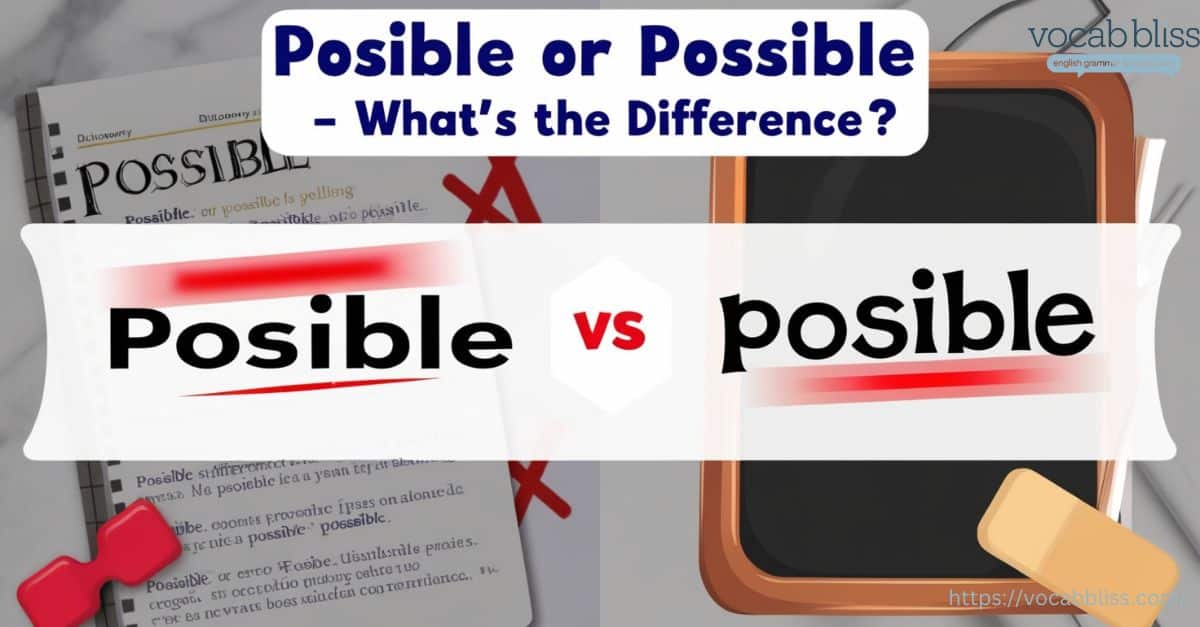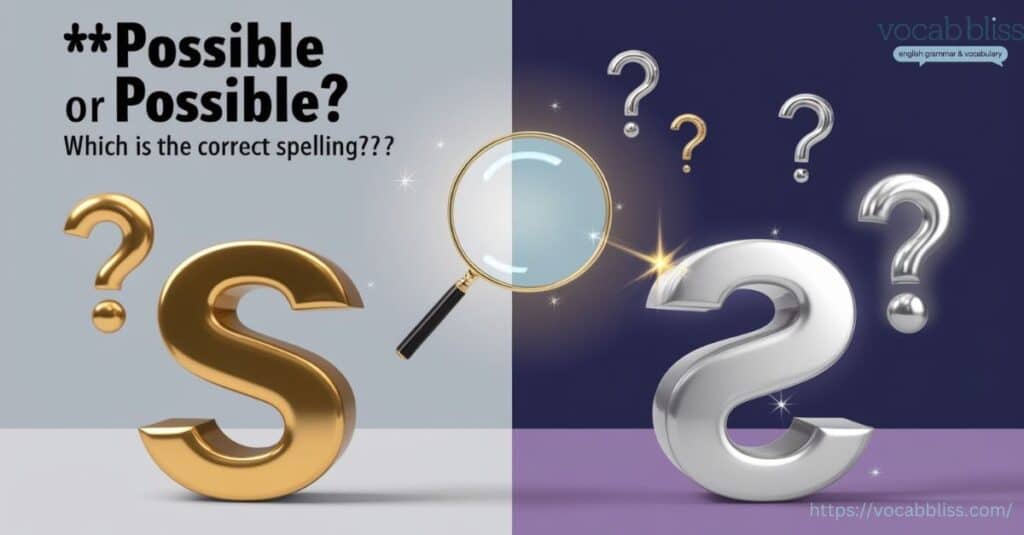The debate between “posible or possible” often arises due to language differences, typographical errors, or lack of clarity in spelling. Understanding the correct usage is critical, especially in professional and academic writing, where spelling precision reflects your credibility.
This article dives deep into the distinctions between these terms, their meanings, usage, and how to avoid common pitfalls.
Quick Summary
The key difference between “possible or posible“ lies in language and spelling. While “possible” is the correct spelling in English, commonly used to describe something that can be achieved or might happen, “posible” is the accurate spelling in Spanish with the same meaning. In English, “posible” is considered a misspelling and should be avoided. To ensure correct usage, remember that “possible” features a double “s” in English, aligning with its grammatical rules. This distinction is crucial for clear communication, particularly in professional or academic contexts.
Posible Or Possible – What’s the Difference?

The confusion between “possible or posible” often stems from linguistic and typographical factors. While these words may seem similar, their correctness depends on the language and context. Let’s explore the differences in detail.
Read More: Truely or Truly: Which One Is Correct?
Why Posible in english Is a Common Misspelling
- Language Influence:
“Posible” is a valid word in Spanish, meaning “possible.” Spanish speakers or bilingual individuals may mistakenly use “posible” in English due to language interference. For example:- Spanish: “Es posible viajar mañana.” (It’s possible to travel tomorrow.)
However, in English, this spelling is incorrect.
- Spanish: “Es posible viajar mañana.” (It’s possible to travel tomorrow.)
- Phonetics and Typing Errors:
The English word “possible” has a phonetic similarity to “posible,” leading to accidental misspellings, especially in informal or rushed writing. The omission of the second “s” is a frequent error for non-native English speakers or typists unfamiliar with the word. - Lack of Familiarity with English Spelling Rules:
English often features double consonants in words like “possible,” “accessible,” and “address.” However, these rules might not align with the spelling norms in other languages, which can lead to confusion. Consequently, it’s important to pay attention to these spelling differences when writing in English.
Why “Possible” Is Correct in English
“Possible“”Possible”is the only correct spelling in English. It is, in fact, derived from the Latin word possibilis, which means ‘able to be done.’ Over time, this term, therefore, gradually evolved into the standardized English spelling that we use today.” Consequently, it has become the accepted form in modern English.
Key Characteristics of “Possible” in English:
- Double ‘S’: A defining feature of its spelling.
- Standardized Usage: Recognized in all formal, academic, and professional contexts.
- Universal Understanding: Widely understood across English-speaking regions.
Example Sentence:
- “It is possible to resolve this issue with proper planning.”
How to Spell Possible
The correct spelling of the word is “possible,” with a double “s” in the middle. This spelling, therefore, adheres to English language rules and originates from the Latin word possibilis, meaning “able to be done.”Therefore, it’s important to remember the double “s” when writing in English.
To ensure accuracy:
- Break it into syllables: pos-si-ble.
- Remember that the middle portion requires two “s” letters, not one.
- Use tools like spellcheck or memory aids, such as:
- “It’s possible to succeed with double effort (double ‘s’).”
Common Misspelling:
- Posible: This is incorrect in English but valid in Spanish. Avoid using “posible” when writing in English to maintain proper spelling.
By following these tips, you can confidently use “possible” in all your English writing!
What Does “Possible” Mean?
Definition and Usage in Everyday English
In English, “possible” is an adjective that describes something that can be done or achieved. It, therefore, denotes feasibility or likelihood.
Definition:
- Capable of being done, occurring, or achieved.
- Existing in the realm of possibility.
Examples:
- “Is it possible to finish the project by tomorrow.”
- “Traveling to Mars may be possible in the future.”
Synonyms for “Possible”

To enhance your writing or speech, you can use these synonyms, which carry subtle nuances:
Example: “It’s likely that we’ll finish the project ahead of schedule.”mplete this task within a week.”
Feasible: Emphasizes practicality or realism.
Example: “It’s feasible to automate this process using modern software.”
Attainable: Focuses on achieving a goal through effort.
Example: “Winning the competition is attainable with rigorous training.”
Conceivable: Relates to something that can be imagined or thought of.
Example: “It’s conceivable that artificial intelligence will revolutionize healthcare.”
Likely: Suggests a high probability.
Posible or Possible: Side-by-Side Comparison

The distinction between “posible” and “possible” lies primarily in language and usage. While “possible” is the correct spelling in English, “posible,” on the other hand, is a valid word in Spanish. Therefore, a clear comparison helps not only highlight the differences between these terms but also avoid any confusion.
Quick Reference Table
| Aspect | Posible | Possible |
|---|---|---|
| Language | Spanish | English |
| Meaning | Refers to something achievable or feasible | Refers to something achievable or feasible |
| Spelling Correctness | Incorrect in English; correct in Spanish | Correct spelling in English |
| Pronunciation | /po-SEE-ble/ (Spanish phonetics) | /ˈpä-sə-bəl/ (English phonetics) |
| Usage Context | Used exclusively in Spanish contexts | Used in all English-speaking contexts |
| Examples | “Es posible viajar mañana.” | “It is possible to travel tomorrow.” |
Detailed Comparison
Spelling Correctness
- Posible: In English, this spelling is incorrect. Its usage often results from typographical errors or interference from Spanish.
- Possible: This is the accepted spelling in English, used across formal, academic, and casual contexts.
Language-Specific Usage
- Posible: A proper word in Spanish, derived from the same Latin root as its English counterpart.
- Possible: The English adaptation of the Latin possibilis. Its double “s” conforms to English spelling norms.
Examples in Sentences
| Language | Word | Sentence Example |
|---|---|---|
| Spanish | Posible | “Es posible que lleguemos a tiempo.” |
| English | Possible | “It’s possible we will arrive on time.” |
Why the Confusion Happens
- Language Interference: Bilingual individuals might default to “posible” in English because it looks correct in their primary language.
- Phonetic Similarity: Both words sound alike, so spelling errors are common, especially for non-native English speakers.
- Typographical Errors: When typing quickly, users may inadvertently skip the second “s” in “possible.”
Examples in Everyday Usage
| Scenario | Correct Sentence (English) | Incorrect Sentence |
|---|---|---|
| Business Email | “It is possible to schedule a meeting next week.” | “It is posible to schedule a meeting next week.” |
| Personal Statement | “Anything is possible with hard work.” | “Anything is posible with hard work.” |
| Academic Paper | “Is it possible to achieve this outcome?” | “Is it posible to achieve this outcome?” |
Tips to Avoid the Mistake
- Double-Check Your Spelling: Always verify the spelling of “possible” when writing in English.
- Use Language Tools: Tools like Grammarly can identify and correct misspellings.
- Practice Writing: Familiarize yourself with English spelling norms through practice and reading.
- Remember the Rule: English uses double “s” for “possible” to follow its language conventions.
By understanding the distinction between “possible or posible,” you can communicate more effectively and, as a result, avoid common spelling mistakes.
“Possible” in Literature and Media

Quotes and References
The word “possible” often appears in inspirational or motivational contexts:
- “It always seems impossible until it’s done.” – Nelson Mandela
- “Everything is possible for one who believes.” – Mark 9:23
These quotes emphasize the hopeful and achievable nature of the term “possible.”
Featured Misspellings and Related Errors
Common Variations of “Possible”
Misspellings arise due to typographical errors or phonetic misinterpretations.
| Incorrect Spelling | Correct Spelling | Reason for Error |
|---|---|---|
| Posible | Possible | Missing second “s” |
| Possable | Possible | Phonetic confusion |
| Possibel | Possible | Typographical error |
How to Avoid Spelling Pitfalls
- Proofread Carefully: Review your text for errors before finalizing.
- Use Tools: Rely on grammar and spelling checkers like Grammarly or Microsoft Word.
- Practice Writing: Regular practice helps reinforce correct spelling habits.
FAQs About “Posible vs Possible”

Is “Posible” Ever Correct?
Yes, but only in Spanish. In English, “possible” is the sole correct spelling.
Memory Tricks for Correct Spelling
To remember the correct spelling, think of the double “s” in “possible” as representing “sure” and “secure.” In this way, these words help reinforce that this is the right choice in English.
Conclusion: Mastering the Spelling
In English, the only correct spelling is “possible.” Whether you’re writing for professional, academic, or personal purposes, mastering spelling ensures clear communication and professionalism. Use this guide to avoid common errors and improve your language skills, making your writing more effective and credible.
Remember: When in doubt, rely on tools, practice, and resources to confirm the correct usage of terms like “possible.” Your attention to detail makes a significant difference in how your message is perceived!
Expand Your Knowledge:
- Since vs Sense: Mastering the Difference and Usage
- Scraped vs Scrapped? Let’s Eliminate the Confusion
- Content vs Context: What marks the difference?
- Batton or Baton: Which One Is Right?

Jorge Phillips is an experienced blogger who writes for Vocab Bliss, sharing his passion for the English language. With a knack for simplifying complex grammar rules and a focus on commonly confused words, Jorge helps readers navigate the nuances of English with ease. His insights aim to make learning engaging and practical.







